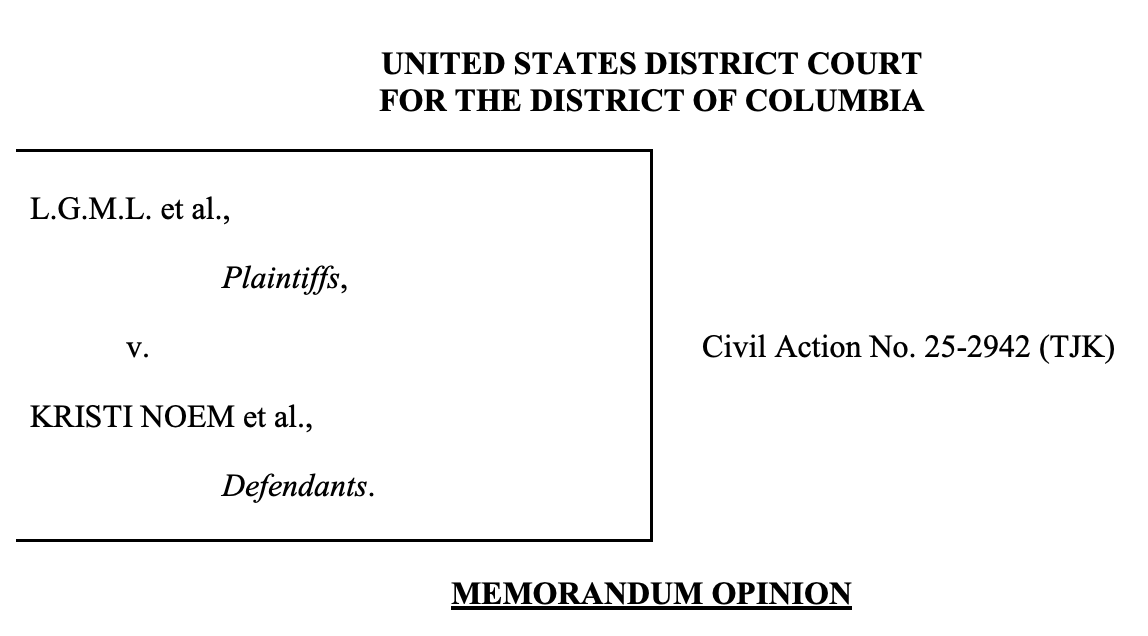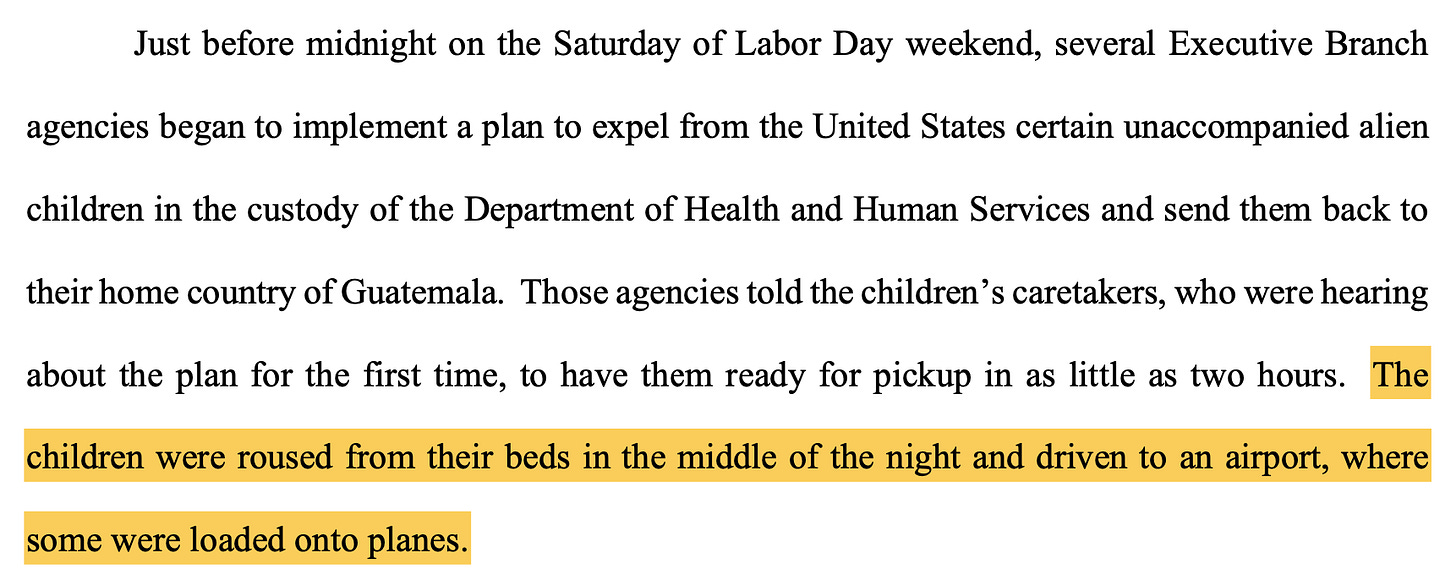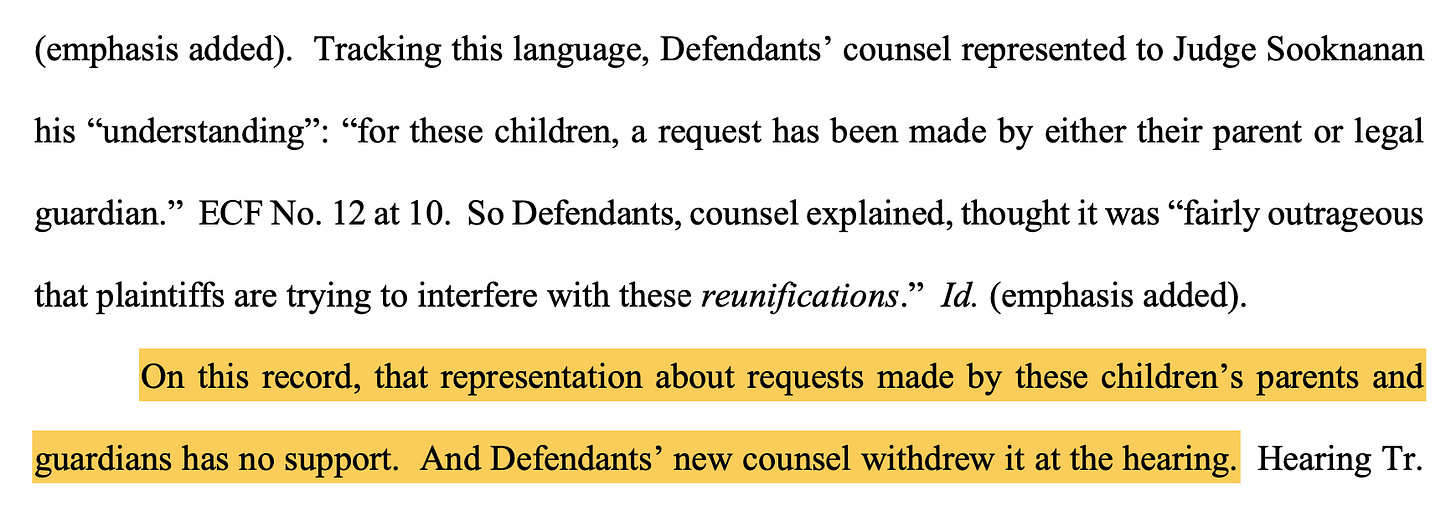Judge criticizes Trump admin, blocks effort to quickly deport children to Guatemala
Judge Timothy Kelly, appointed by Trump in 2017, questioned whether the "plan" was implemented in "good faith" and found that one initial claim "turned out not to be true."
On Wednesday morning, U.S. District Judge Timothy Kelly issued a sharp ruling that stopped the Trump administration’s attempt at immediate removal of unaccompanied children back to Guatemala during litigation over the alarming effort.
The ruling from a judge President Donald Trump appointed to the federal bench back in 2017 harshly questioned the actions of the Justice Department, Health and Human Services Department, Department of Homeland Security, and others within the administration for their actions in this “plan.”
At one point in Kelly’s 43-page opinion, for example, in examining the Office of Refugee Resettlement’s application of the “criteria” purportedly used to determine which children the U.S. was trying to send back to Guatemala under cover of night, he stated bluntly that “the record and Defendants’ conduct suggest that they are not applying their criteria accurately, consistently, or in ways that reflect good faith.”
Under Kelly’s preliminary injunction, the Trump administration is barred from “transferring, repatriating, removing, or otherwise facilitating the transport” of “all unaccompanied alien children from Guatemala“ who do not meet other grounds for deportation “from the United States” because the administration’s actions likely violate the requirements of the William Wilberforce Trafficking Victims Protection Reauthorization Act of 2008 (TVPRA).
The administration’s initial argument that the effort was all about reunifying children with their parents, Kelly wrote, “crumbled like a house of cards about a week later.”
Kelly’s opinion was made all the more striking — and important — given the actions of the Trump administration in recent days to ignore federal laws and pressure private actors with threat of government enforcement actions if they don’t comply with their demands — and the actions of some of those actors to capitulate to that pressure.
Kelly — the second judge to have the case that was filed in the middle of the night over Labor Day weekend — ultimately echoed the initial classwide temporary restraining order issued by U.S. District Judge Sparkle Sooknanan at that time.
Sooknanan, a Biden appointee, received the case as she was the judge handling emergency duties for the court over the holiday weekend. Over the course of that weekend, Sooknanan acted to provide immediate relief — and hold the administration accountable for that relief. After the weekend, the case was taken off the emergency-duty docket and assigned to Kelly.
After further briefing and a hearing before Kelly, he extended Sooknanan’s TRO twice before issuing his opinion and order on Thursday granting provisional class certification and a preliminary injunction.
Under the TVPRA law, Kelly detailed, any unaccompanied minor from any country other than Canada or Mexico “must be placed in standard removal proceedings, is eligible for voluntary departure, and must be provided access to counsel when practicable” in order to be removed from the U.S.
The Trump administration argued that “reunification and repatriation authorities are distinct from removal,“ but Kelly wasn’t buying it. “Both are things that happen after a removal, but they are not the same thing,” he wrote, concluding:
In the end, Defendants tried—and still want—to remove unaccompanied Guatemalan children from the United States. But because “calling a thing by a name does not make it so,” … Defendants cannot dodge their statutory obligations under the TVPRA by asserting that these children are being reunified or repatriated without being removed.
The most stark finding by Kelly challenged the initial claim by the Justice Department’s Drew Ensign over Labor Day weekend in court that this was an organized, intentional plan of reunification involving the parent or parents in Guatemala. Referencing a provision in federal law that puts ORR in charge of reuniting children “with a parent abroad in appropriate cases,“ Kelly wrote:
Kelly went on to describe a report from Guatemala’s Attorney General finding that “less than 20 percent of the 609 children [listed by the Trump administration] even had identifiable parents with whom reunification was possible.“ It is as shocking as it sounds, and Kelly did not suggest he was letting the Trump administration off the hook for that.
“[A]lthough there may be an explanation for this discrepancy between the Guatemalan Attorney General’s report and Defendants’ earlier justification for their ‘reunification’ plan, Defendants have not offered one,“ he wrote. (I do not think this is the last we will hear about this, but it was all that was necessary for purposes of the preliminary injunction order.)
After finding, for purposes of the preliminary injunction, that the plaintiffs are likely to succeed on their claim that the Trump administration is violating the TVPRA, Kelly moved on to the other preliminary injunction factors.
As for whether the plaintiffs showed they would face irreparable harm without an injunction, more stark statements from Kelly:
Not only is Kelly focused on the questions about the Labor Day weekend actions, in other words, but he also sounded almost incredulous that the administration — having been caught — is not willing to stand down.
“While Defendants plunged ahead in the middle of the night with their ‘reunification’ plan and then represented to a judge that a parent or guardian had requested each child’s return, that turned out not to be true,” Kelly wrote of Ensign’s claims. “Such a rushed, seemingly error-laden operation to send unaccompanied alien children back to their home countries is one of the things that the TVPRA’s process prevents.“
And while Thursday’s injunction only related to Guatemala, Kelly made perfectly clear that he stands willing, ready, and able to expand the class and injunction if necessary:
[T]he Court does not foreclose expanding the class later if developments warrant that adjustment. Defendants should not construe this decision as an invitation to take similar action with respect to these other unaccompanied alien children. For the same reasons explained [in the opinion], any such attempt to expel them is likely to be unlawful.
This is not — particularly after 2008’s passage of the TVPRA — an action that challengers should have to bring to court, let alone defend as vigorously as has been needed here.
But, the challenge was needed. It was brought — quickly and aggressively — and Judges Sooknanan and Kelly both held the administration to account for its actions and issued orders blocking the administration’s scheme.
That is about as good a lesson as I could see for those watching the Trump administration’s actions over the past week.







I’m thankful that even some Trump-appointed judges can place the rule of law above concern for their reputation!
“The Biden judge is effectively kidnapping these migrant children and refusing to let them return home to their parents in their home country,” Trump aide Stephen Miller wrote on X that day. Now that a Trump appointee called them on their deception and outright lies let's see how long it takes for them to turn on him, too. How are they going to spin that one?